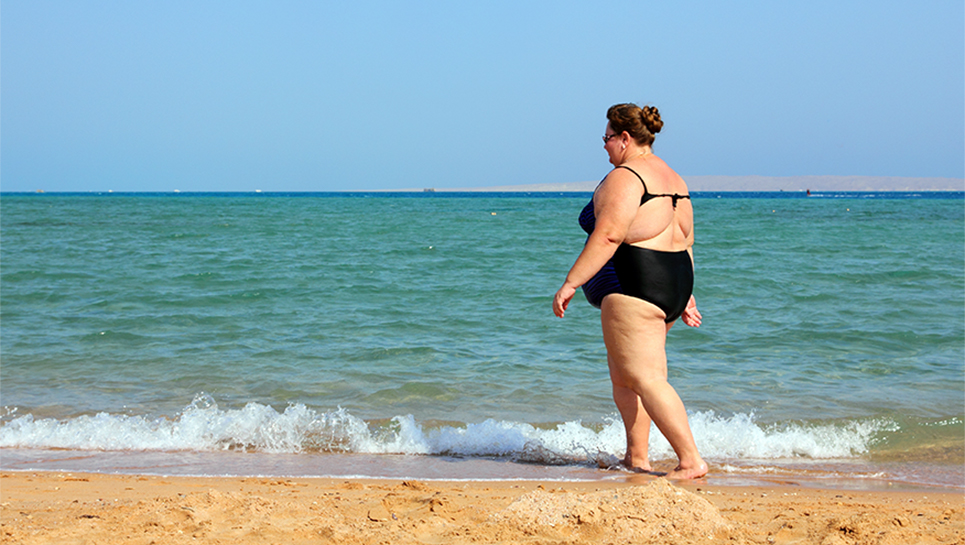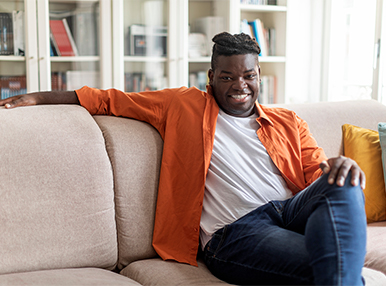Feeling Comfortable
September 5, 2023

It is common for higher weight people to hear something along the lines of the following from thinner people: “I think it is great when people are happy in their larger body and I support that 100%. For me, though, I am just more comfortable when I’m at a lower weight.”
First of all, I want to acknowledge that people get to “feel” however they want. It isn’t my intent to tell people that their feelings are wrong, but I would like to take a deeper look at where those feelings come from, and how expressing them can be hurtful or even harmful.
Let’s unpack this idea of comfort, starting with what is meant here by “comfortable.” It could mean that the person is physically more comfortable in their clothing when their body is a smaller size. Within financial means, an option could be to get some larger clothing or a different style that more comfortably fits their shape. This is a shift from “my body is the wrong size” to the clothes are the wrong size.
Our society has created a lot of stigma around clothing sizes – some sizes are “good,” some are acceptable, and some are considered shameful to admit to wearing. Larger sizes can require going to a different part of the store, or a different store altogether or are maybe not even available in a store – inconvenient, frustrating and discomforting. In addition to the shame often assigned to having to go “up a size,” it can be frustrating to find limited options in larger sizes, and often limited styles. So, we may be willing to give up some physical comfort in order to wear a socially acceptable size.
It can also be psychologically uncomfortable to sit with friends or work colleagues while they discuss their latest diet “successes,” especially if one has been gaining weight or rejecting the diet paradigm. People in larger bodies are met with society’s disapproval on a regular basis, which makes it uncomfortable to be out and about, especially, for just one example, at a beach in a bathing suit. There are entire businesses designed to make us feel uncomfortable wearing a bathing suit unless we meet rigid societal norms of “acceptable.” Of course, it is uncomfortable to feel society’s disapproval and not be able to be fully oneself in public. The problem, though, is not my body. The problem is society’s expectations, which to a large extent are driven by the diet industry and others who benefit financially if we are perpetually dissatisfied with our bodies. (See Reviewing “Weight Science”.) Of course being in a smaller body is more comfortable because it protects us at least somewhat from the stigma and oppression of anti-fatness.
Some people also associate being in a larger body with physical discomfort in movement, for example, not being able to comfortably do their favorite hike, take a yoga class, or maintain their garden. While some people may have or develop physical limitations to certain activities, being in a larger body in and of itself isn’t necessarily one of them. The ability to do many activities relies on a certain level of fitness, flexibility and/or strength, regardless of body size. These may be able to be developed, or adaptive strategies can be used. Check out these options as just a few examples:
- Fat Girls Hiking

- Curvy Yoga
- Adaptive Gardening – I encourage you to do an online search on this. There are many different resources catering to various adaptive needs, so find what works for you. The point is that there are many ways to adapt gardening to our body’s strengths and limitations, and to do this nourishing activity comfortably.
All this to say that body liberation is for all of us. It isn’t just what we teach our students or share with our clients or communities. It is personal work as well. In her book, “’You Just Need to Lose Weight’ and 19 Other Myths About Fat People,” Aubrey Gordon addresses this issue in Myth #14. She explains:
“Among all that explicit bias, implicit bias can prove more difficult to spot. Those with privilege assume that if we’re not using slurs, publicly humiliating others, or telling oppressive jokes, that we are not biased. But anti-fat implicit bias is all around us, and many of us perpetuate it, intentionally or not. On bad days, many describe a negative body image by saying they “feel fat,” without considering the ways those comments tell their fat friends that being fat means being unhappy, isolated, unloved, and unlovable. Many casually engage in diet talk with fat and thin people alike, talking endlessly about the lengths they’ll go to in order to avoid looking like fat people such as me.” (Gordon, 2023; page 121)
 Even if we have worked on our explicit bias, the implicit bias needs to be uprooted, too, and those roots often go very deep. Diet culture has instilled this shame of being in a larger body in us – their business model and profits depend on it – and the lessons often start at a young age.
Even if we have worked on our explicit bias, the implicit bias needs to be uprooted, too, and those roots often go very deep. Diet culture has instilled this shame of being in a larger body in us – their business model and profits depend on it – and the lessons often start at a young age.
Body liberation includes paying attention to the feelings we have about our bodies, and a responsibility to examine whether those feelings were taught to us, or if they come from the parts of us that are most compassionate, wise and loving. It is likely that those parts would encourage us to feel comfortable and appreciate bodies of all sizes and abilities.
Thanks to Katie Borofka for her insights to improve this article.
EDUCATOR'S TIP
Discussing the complex relationship between weight and health (and a definition beyond physical health) is a great opportunity for students to deepen their understanding of social determinants and of the “correlation does not equal causation” principle, including what epidemiology does or does not tell us about individuals.
There are correlations between health and weight, diet, physical activity, and stress. What links are strongest? What other factors might be at play? Important Note: Even if a person’s health issue is related to their weight, they still deserve to receive the same quality, attentive health care that a thinner person would. Broadening the lens about potential contributors to a health issue is meant to expand the options for improving health beyond “just lose weight,” which is often the only option given to a person in a larger body.
ALLY ACTION
- Don’t say, “I feel fat.” Fat is not a feeling. (See below.)
- Do commit to unpacking your own implicit anti-fat bias. The “Curious to Learn More?” section of this and other pages on this website have lots of ideas for doing that, as well as the Resources page.
- Focus on reducing the anti-fat bias in our society, rather than reducing our bodies.
CURIOUS TO LEARN MORE?
-
Gordon, A. (2023). “You Just Need to Lose Weight” and 19 Other Myths About Fat People. Beacon Press.
-
Dealing with Toxic Lunchroom Talk and Advocating for the Possibility for Culture Change from Center for Body Trust.
- 7 Ways to Uproot Your Anti-Fat Bias by Your Fat Friend (Aubrey Gordon); March 2, 2020; in Medium.
- Seven Things You Might Be Feeling When You “Feel Fat” by Your Fat Friend (Aubrey Gordon) and Roza Nozari; in iweighcommunity.com.